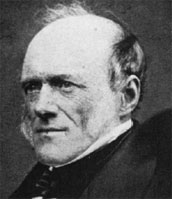Charles Lyell and Uniformitarianism
Charles Lyell and
Uniformitarianism
The geologist Sir Charles Lyell (1797
to 1875; Figure 6-3) established in
his Principles of Geology (1830 to
1833) the principle of uniformitarianism.
Uniformitarianism encompasses
two important principles that
guide the scientific study of the history
of nature: (1) that the laws of physics
and chemistry remain the same
throughout the history of the earth,
and (2) that past geological events
occurred by natural processes similar
to those observed today. Lyell showed
that natural forces, acting over long
periods of time, could explain the formation
of fossil-bearing rocks. Lyell’s
geological studies led him to conclude
that the earth’s age must be measured
in millions of years. These principles
were important for discrediting miraculous
and supernatural explanations of
the history of nature and replacing
them with scientific explanations. Lyell
also stressed the gradual nature of geological
changes that occur through
time, and he argued further that such
changes have no inherent tendency
to occur in any particular direction.
Both of these claims left important
marks on Darwin’s evolutionary
theory.
 |
| Figure 6-3 Sir Charles Lyell (1797 to 1875), English geologist and friend of Darwin. His book Principles of Geology greatly influenced Darwin during Darwin’s formative period. This photograph was made about 1856. |




